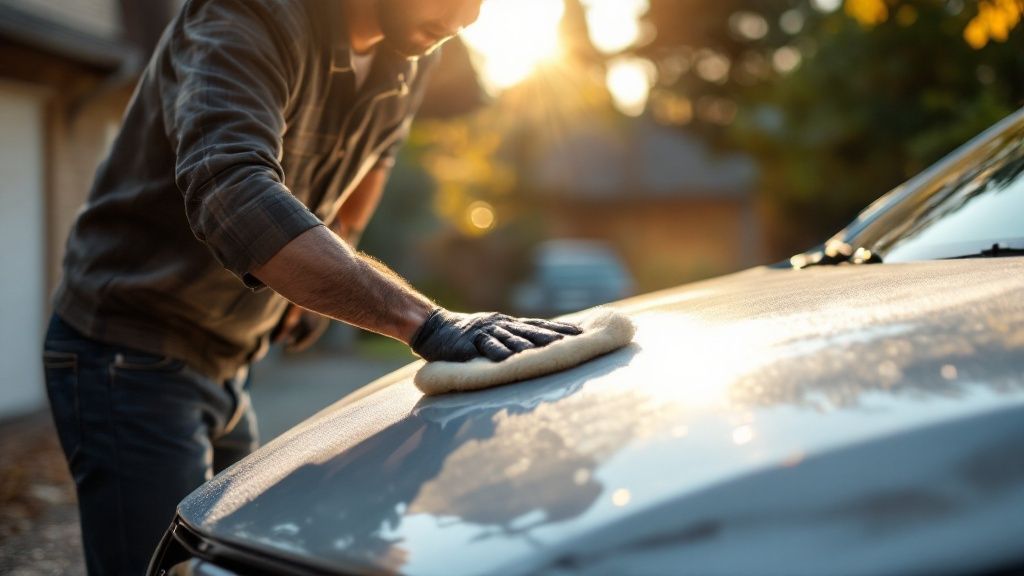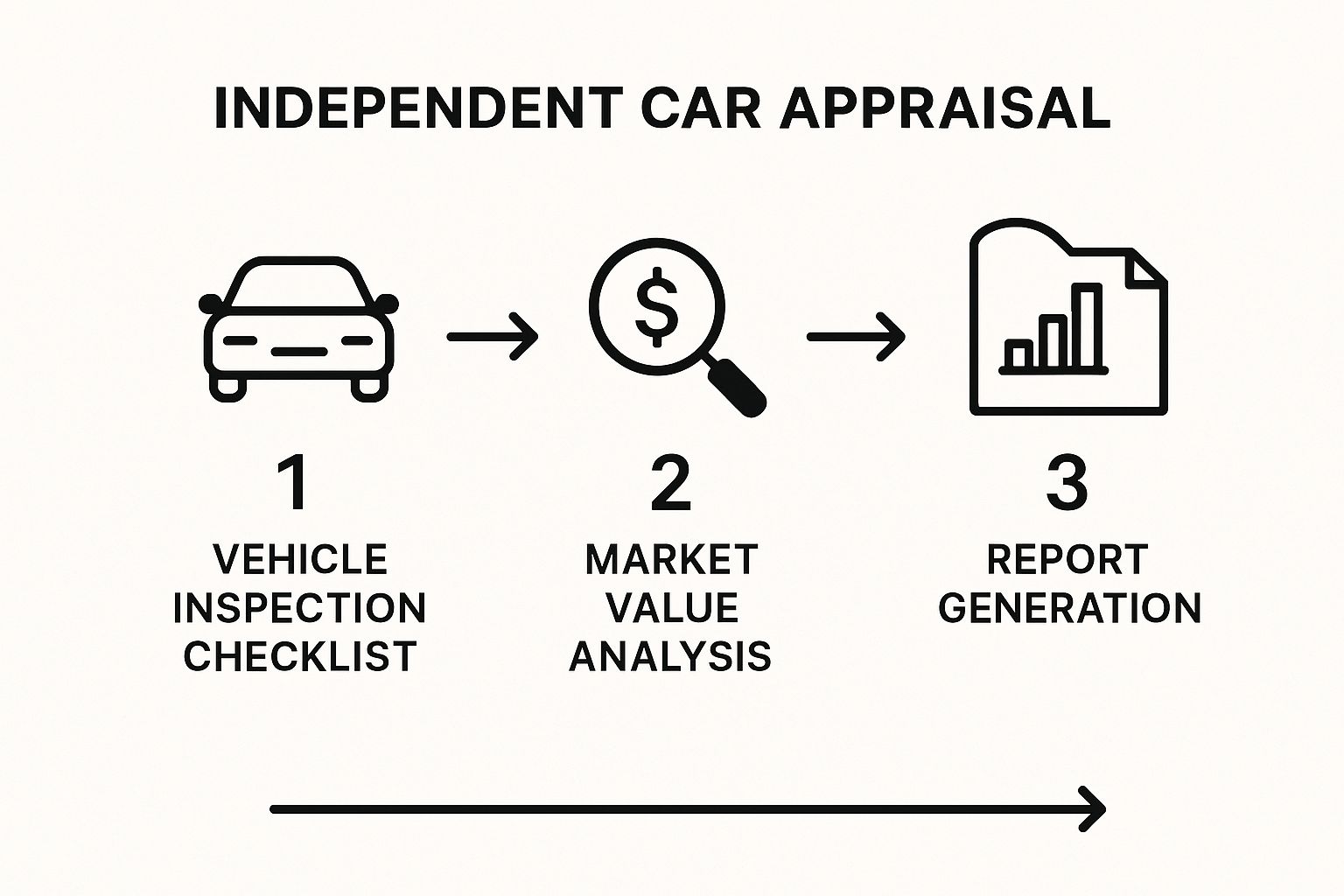So, what exactly is an independent car appraisal? Think of it as hiring a certified expert whose only job is to determine the true, unbiased value of your vehicle. This isn't the same as the quick assessment done by the insurance company; this is a detailed valuation conducted by a professional you hire to work strictly for you. It's hands-down your best tool for fighting back against a lowball settlement offer.
Your Strongest Ally Against Low Insurance Offers

After a wreck, the insurance company will, of course, run its own numbers to figure out what your car is worth. But let's be clear: their goal is not the same as yours. They're a business, and their primary objective is to close out your claim for the smallest amount possible to protect their bottom line. That's a classic conflict of interest.
It's a bit like asking the opposing team's coach for advice on your next play. You wouldn't do it, right? Relying only on the insurer's valuation is essentially the same thing—you're accepting a figure from someone who has a direct financial incentive to pay you less than you deserve.
An independent car appraisal cuts through that conflict by bringing in an impartial, expert voice. This professional has zero ties to the insurance company. Their only duty is to give you an honest, detailed, and evidence-based assessment of your vehicle’s fair market value.
The Power of an Unbiased Perspective
The real magic of an independent appraiser is their objectivity and attention to detail. Insurance companies often lean on automated software that spits out a generic number, frequently overlooking the very things that make your car unique. A real, human expert does things differently.
Their hands-on evaluation will typically include:
- A thorough physical inspection of your car's actual condition, mileage, and specific features.
- Accounting for all the enhancements you've made, like recent major maintenance, new tires, or custom modifications.
- Deep-dive market research to find what comparable vehicles have actually sold for right in your local area.
By working exclusively for you, an independent appraiser levels the playing field. Their comprehensive report provides the credible, third-party evidence needed to counter a low offer and negotiate a fair settlement based on facts, not algorithms.
Why This Matters in Today's Market
The car market has been on a wild ride lately, making objective valuations more important than ever. Vehicle prices have shot up due to supply chain hiccups and inflation. This means both new and used cars are worth more, which directly impacts appraisals. We're even seeing newer cars get totaled out after moderate accidents simply because repair costs are bumping up against these inflated market values. You can learn more about how market trends affect total loss appraisals from industry experts who track this data closely.
All this volatility just highlights the need for a valuation that’s plugged into what's happening right now in your local market—and that's exactly what an independent expert delivers.
Insurance Appraiser vs Independent Appraiser at a Glance
This quick comparison highlights the fundamental differences in loyalty, methods, and goals between an insurer's valuation and a report from your independent expert.
| Factor | Insurance Company Appraiser | Your Independent Appraiser |
|---|---|---|
| Primary Loyalty | To the insurance company's financial interests | Exclusively to you, the vehicle owner |
| Valuation Goal | To minimize the claim payout amount | To determine the true, unbiased market value |
| Methodology | Often relies on generic software and databases | Uses hands-on inspection and local market data |
| Report Detail | Typically a basic, computer-generated summary | A comprehensive, detailed, and defensible report |
As you can see, the two approaches are worlds apart. Investing in your own appraisal is a smart move to protect your financial interests and ensure you're treated fairly.
How to Get More Money for Your Totaled Car

There are few things more frustrating than hearing your car is a "total loss." That is, until you get the insurance company's settlement offer. If that number feels like a slap in the face, you’re not alone. This isn't just a string of bad luck—it's often the direct result of how insurers calculate your car's value.
Most major insurance carriers plug your car’s details into third-party valuation software to get an "Actual Cash Value" (ACV). These programs are built for one thing: processing claims as quickly and cheaply as possible. They aren't designed to be accurate.
This one-size-fits-all approach completely overlooks the details that make your car unique and valuable in the real world. Things like a recent engine rebuild, brand-new premium tires, or that sought-after factory tech package are often ignored, leading to a lowball offer that won't come close to replacing what you lost.
Building a Rock-Solid Case for What Your Car Is Really Worth
So, how do you fight a number spit out by a computer? You counter it with a real valuation, built by a human expert. This is where an independent car appraisal comes in. A certified appraiser doesn’t just pull a number from a database; they build a detailed, evidence-based case for your vehicle's true worth, from the ground up.
The process is methodical and focuses on everything the insurer’s software glossed over:
- A Hands-On Vehicle Inspection: The appraiser gets up close with your vehicle to document its actual condition, mileage, and features.
- Credit for Your Upgrades: They know how to put a dollar value on recent major repairs (like a new transmission), premium trim levels, and even custom modifications.
- Hyper-Local Market Research: Instead of using vague regional data, they hunt for actual comparable cars for sale right in your area to establish a fair, local market price.
Let's say your 2018 SUV was totaled. The insurer offers you $18,000, basing it on base-model vehicles. But you had the top-tier tech package, a panoramic sunroof, and you just spent $2,500 on new all-terrain tires. An independent appraiser will document every one of those upgrades, find similar well-equipped models selling locally for $22,000, and create an ironclad report that proves you’re owed the higher amount.
Why Meticulous Documentation Is Your Best Weapon
An independent appraiser’s final report is much more than a number—it’s your most powerful negotiation tool. It provides undeniable proof of your car’s value, making it incredibly difficult for an adjuster to simply say no to your counteroffer.
A professional appraisal report completely changes the conversation. It forces the insurance company to look beyond their automated estimate and deal with the specific, real-world evidence of your car’s higher value.
This report gives you serious leverage. It’s no longer your opinion versus theirs; it’s a certified expert's documented findings against a computer printout. Knowing how to handle this is crucial, and you can learn more about navigating the process with a good total loss estimate.
Keeping Up With Today’s Crazy Car Market
The used car market has been on a wild ride lately, which makes an independent appraisal more critical than ever. We've seen some very unusual trends, with used car prices holding strong when they would normally be dropping. The Manheim Used Vehicle Value Index, a key industry benchmark, actually reported a month-over-month increase in mid-September when prices should have been softening.
This sustained market strength means your car is likely worth a lot more than an insurer's outdated data suggests. An independent appraiser works with current, local market data to make sure your settlement reflects what's happening right now. They connect the dots between the big market trends and the specific value of your car, in your city, today—ensuring the check you get is the one you rightfully deserve.
Recovering a Car's Lost Value After an Accident

Let's be honest. Even after the best body shop in town makes your car look brand new, a vehicle with an accident on its record is worth less than one without. It’s a hard fact of the market. This permanent drop in what your car is worth is called Diminished Value (DV), and it's a real financial loss you're legally entitled to recover from the at-fault driver's insurance.
Think of it this way: would you pay the same for two identical houses, if you knew one of them had previously had a major fire? Probably not, even if the repairs were perfect. The history alone changes its value. The exact same logic applies to your car after a wreck.
That accident history creates a financial gap, and you shouldn’t be the one stuck paying for it. Getting an independent car appraisal is the single most important step you can take to prove your loss and get the money you deserve.
Understanding Inherent Diminished Value
The most common type of loss we deal with is Inherent Diminished Value. This is the automatic, immediate drop in value that happens the moment an accident is recorded against your car's VIN. Even with flawless repairs that you can't see, future buyers will always pay less for a car that’s been in a collision.
It has nothing to do with the quality of the repair work; it's all about how the market sees it. When a potential buyer runs a vehicle history report and sees a wreck, they get nervous. That forces you to slash your asking price to even get them interested, and that financial hit is your inherent diminished value.
An independent appraisal takes this out of the realm of opinion and turns it into fact. It stops the "he said, she said" argument with the insurance company and replaces it with a documented, evidence-based report they can't ignore.
How an Appraiser Calculates Your Loss
A professional appraiser doesn't just pull a number out of thin air. We use a systematic, data-backed method to build a rock-solid case for your car's lost value. This process goes far beyond the simplistic formulas insurance adjusters often try to use.
A certified appraiser will dig into several key factors to pinpoint the exact value your vehicle has lost:
- Severity of the Damage: A small fender-bender obviously causes less diminished value than a major collision that required frame straightening. The appraiser will pore over every line of the repair invoice to understand exactly what was fixed.
- Vehicle Prestige and Type: Luxury brands, sports cars, and brand-new models take a much bigger hit to their value after an accident. The buyers for these types of cars demand a spotless history and will pay a premium for it.
- Market Perceptions: This is where expertise comes in. A good appraiser knows the local market inside and out. They use real-time sales data to show how cars like yours with accident histories are selling for less in your area.
By weaving these elements together, the appraiser creates a comprehensive report that shows their work, step-by-step. This professional document is your strongest weapon in negotiations. You can learn more about this by seeing what a https://totallossnw.com/diminished-value-after-car-accident/ actually involves.
While an appraisal helps you recover value after an accident, prevention is always the best medicine. Installing a robust car security system can help prevent theft and other incidents that also destroy your car's value. Protecting your investment from the start is just smart ownership.
Navigating the Independent Appraisal Process
Starting the process for an independent car appraisal can feel overwhelming, but it’s really just a logical, step-by-step affair. Think of it as building a solid, evidence-backed case for what your vehicle is truly worth. You don't have to be the expert; you just need to know the path forward.
It all begins the moment you decide to push back on the insurance company’s lowball offer. From there, a professional appraiser takes the wheel, steering you through a structured process designed to land on a fair and accurate valuation. It’s about turning a confusing mess into a clear, actionable plan.
The Initial Consultation and Document Gathering
Your first stop is the initial consultation. This is your chance to talk with a potential appraiser, lay out your situation—whether it's a total loss or a diminished value claim—and give them the basics on your car and the accident. It's a no-pressure conversation to see if they're the right person to fight for you.
Once you hire them, the appraiser needs documentation to build your case file. This is the groundwork for all their research. Get ready to pull together things like:
- The insurance company's initial estimate or settlement offer.
- Any photos you have of the vehicle before and after the accident.
- All repair estimates and, most importantly, the final itemized repair bill.
- Records of recent major maintenance, upgrades, or even new tires.
This paperwork tells the story of your vehicle’s condition and the real-world impact of the accident.
The image below lays out the core stages of an appraisal, from the hands-on inspection to the final report that does the talking for you.

As you can see, each step builds on the last, creating a thorough and systematic valuation that’s hard for an insurer to ignore.
In-Depth Inspection and Market Research
With your documents organized, the appraiser gets to the most important part: the hands-on evaluation. This is where a real expert’s work stands apart from the insurance company's generic software. They’ll perform a meticulous physical inspection of your car to document its real condition, unique features, and the quality of the repairs.
This isn't just a quick walk-around. A good appraiser looks for subtle signs of lingering damage, confirms the presence of high-value options the insurer might have missed, and gets a true sense of the vehicle’s pre-accident condition. This detailed approach is what lets them argue for your car's specific value, not some generic number spit out by a database.
Next, the appraiser dives deep into market research. This goes way beyond a quick online search. They’ll hunt for comparable vehicles—or "comps"—that have recently sold in your local market. The entire goal is to pinpoint real-world sales data that shows what a willing buyer would have paid for a car just like yours right before the accident happened.
A professional independent car appraisal is built on local, real-world data, not national averages. An appraiser's ability to find and analyze true comparable sales in your area is what gives the final report its power and credibility.
Assembling and Using Your Appraisal Report
The final stage is putting it all together in the official appraisal report. This document is a powerful summary of everything found during the inspection and research, presented as a formal, defensible valuation. More than just a number, it’s a detailed narrative that explains how and why your vehicle is worth a specific amount.
A credible report has specific components that give it weight. The table below breaks down what to look for to ensure your appraiser's work is solid and defensible against an insurer's arguments.
Anatomy of a Professional Appraisal Report
| Report Component | What It Is | Why It's Crucial for Your Claim |
|---|---|---|
| Vehicle Identification | Full VIN, make, model, year, trim, mileage, and all factory/aftermarket options. | Establishes the exact vehicle being valued, preventing a lowball based on a base model. |
| Condition Statement | A detailed assessment of the vehicle's pre-accident cosmetic and mechanical condition. | Justifies a higher value for a well-maintained vehicle versus one in average or poor shape. |
| Damage Analysis | An expert review of the collision damage and the quality of the subsequent repairs. | Crucial for diminished value claims, as it highlights the "stigma" of accident history. |
| Market Analysis | A description of the local market conditions for your specific type of vehicle. | Provides context for why your car is in demand (or not) in your geographic area. |
| Comparable Sales | A list of at least 3-5 similar vehicles recently sold in your market, with adjustments. | This is the core evidence. It anchors your valuation in real-world, verifiable transactions. |
| Appraiser's Certification | The appraiser's signature, credentials, and a statement of their impartiality. | Gives the report legal and professional standing, showing it's an unbiased expert opinion. |
Once you have this comprehensive report in hand, it becomes your number one negotiation tool. You submit it directly to the insurance company as your formal counteroffer, backed by an expert's detailed analysis.
You’re no longer just a person disagreeing with a number; you are now presenting irrefutable evidence from a certified professional. This simple act fundamentally shifts the power dynamic and forces the insurance company to deal with facts, not just their internal algorithms.
How to Find and Vet a Qualified Appraiser
Let's be blunt: the success of your entire claim—whether it's for a total loss or diminished value—hinges on the appraiser you hire. This isn't just another step in the process; it’s the most important decision you'll make. A genuine expert is your advocate, armed with hard data and years of experience. The wrong choice can sink your case before it even starts.
Finding the right person takes more than a quick Google search. You're looking for a specific blend of credentials, hands-on experience, and a process you can trust. This is about more than just getting a number on a piece of paper. It’s about hiring a pro whose work will stand up under the intense scrutiny of an insurance company.
Look for Certified Credentials
Your first line of defense against a weak appraisal is professional certification. These aren't just fancy letters to put after a name; they prove an appraiser has passed rigorous training, adheres to a strict code of ethics, and keeps up with their education. It shows they're committed to their craft.
One of the most respected credentials in the business comes from the I-AAA (Independent Auto Appraiser Association). An appraiser with this certification has been vetted by their peers and is held to a high ethical standard. It’s an immediate signal that you’re dealing with a serious professional, not just someone who printed up some business cards.
When you hire a certified appraiser, you're not just paying for a report. You're investing in a professional whose credentials give their opinion immediate weight and authority in the eyes of the insurance company.
But certification is just the starting point. Just because an appraiser is certified doesn't automatically make them the perfect fit for your specific claim. Now it's time to dig a little deeper.
Essential Questions to Ask Every Potential Appraiser
Before you hire anyone, you need to conduct a short interview. Their answers will tell you everything you need to know about their experience, their methods, and whether they're the right partner to fight for you.
Here’s a checklist of questions you absolutely must ask:
- Do you have specific experience with my type of claim? An expert in diminished value might not be the best choice for a classic car total loss. Always ask for examples of similar cases they’ve handled.
- What is your process for determining value? A pro should be able to walk you through their entire methodology, from the physical inspection of the vehicle to the market research they use to find true comparable sales.
- Can I see a sample of a report you've created? Ask for a sample report (with personal info blacked out, of course). This will show you the level of detail and professionalism to expect. A flimsy, one-page report is a huge red flag.
- What is your fee structure? Reputable appraisers always charge a flat fee. This is critical because it ensures their valuation is unbiased and not influenced by the final settlement you receive.
It's also worth noting how market trends impact this work. In the U.S., for example, projected rises in light-vehicle sales and stabilizing new car prices directly affect an appraiser's job. According to analysis from Haig Partners, these economic shifts change everything from finding comps to calculating residuals, so your appraiser must be on top of current market dynamics.
Critical Red Flags to Avoid
Knowing what to look for is only half the battle. You also need to know what to run away from. Certain practices are immediate signs that you're dealing with an unprofessional or unethical operator.
If you spot any of these warning signs, it's time to end the conversation and continue your search for a reputable independent auto appraiser near you:
- They charge a percentage of the settlement. This is a massive conflict of interest. An appraiser’s fee should never be tied to the outcome of your claim, period.
- They guarantee a specific outcome or dollar amount. No ethical appraiser can promise a result. They can only promise a thorough, unbiased, and well-supported valuation based on the facts.
- They are reluctant to share their credentials or a sample report. Transparency is everything. A professional who is proud of their work will have absolutely no problem showing you what they can do.
Taking the time to choose your appraiser carefully is the single best thing you can do to ensure your independent car appraisal gives you the leverage needed to get the fair settlement you deserve.
Still Have Questions? Let's Talk Specifics
So, we've covered what an independent appraisal is, how it works when your car is a total loss or has diminished value, and what the process generally looks like. But I find that people usually have a few more practical, "what-if" questions before they're ready to move forward.
This is where the rubber meets the road. Let's tackle the common things people ask about cost, dealing with insurers, and how long this all takes. Think of this as the final Q&A to give you the confidence to take the next step.
How Much Does an Independent Appraisal Cost?
This is usually the first question on everyone's mind, and for good reason. An independent car appraisal is an investment, but it's one that often pays for itself several times over. The exact price tag will depend on the complexity of your situation and the specific vehicle.
Generally, you'll be looking at a flat fee. The costs typically fall into these two buckets:
- Total Loss Appraisals: These are often the most involved because they require a deep dive into the market to pinpoint your car's true pre-accident value. The fee usually reflects that intensive work.
- Diminished Value Appraisals: These reports are focused on a very specific calculation—the loss in market value after repairs—and are priced accordingly.
Here's the most important thing to look for: your appraiser must work on a flat-fee basis. This is non-negotiable. It ensures their valuation is completely unbiased and isn't tied to the size of your potential settlement. It guarantees their only mission is to find the true, accurate value of your loss, period.
Does My Insurance Company Have to Accept It?
This is a big one. While an insurance company isn't legally obligated to instantly accept the number in your independent report, they absolutely cannot just ignore it. A professional, well-documented report from a certified appraiser is powerful evidence that they are required to address.
When you submit an independent car appraisal, you fundamentally change the negotiation. It’s no longer just your opinion against their computer program; it becomes a battle of experts. The insurer's adjuster now has to come up with concrete, verifiable evidence to argue against your appraiser’s findings—and that’s often a very tough thing for them to do.
Your auto insurance policy almost certainly contains something called an "Appraisal Clause." This is your trump card. It's a formal dispute process where you and the insurer each hire an appraiser. If those two still can't agree, they bring in a neutral third appraiser (an "umpire") to make a final, binding decision. Your independent appraisal is the key that unlocks this powerful clause.
Can I Get an Appraisal If My Car Is Leased or Financed?
Absolutely. In fact, I'd argue it’s even more critical to get an appraisal when you have a loan or lease on the vehicle.
If your car is totaled, the insurance payout needs to be enough to clear the remaining balance on your loan. A lowball offer from the insurer could leave you on the hook for thousands of dollars for a car you don't even have anymore.
It's a similar story with a diminished value claim. Even though a bank technically holds the title, you are the one who has suffered the financial hit. The accident has torpedoed your equity in the vehicle. That compensation for diminished value helps make you whole again, and the process works the same whether a lienholder is involved or not.
How Long Does the Entire Process Usually Take?
A thorough, accurate appraisal isn't an instant process, but any good appraiser knows that you need to get this resolved quickly. From your first call to getting the final report in your hands, you can generally expect the process to take anywhere from a few business days to about a week.
A few things can affect that timeline:
- Getting Your Documents: The faster you can supply the appraiser with things like the repair estimate and photos, the faster they can get started.
- The Vehicle Inspection: Scheduling a time for a physical inspection is a key part of the process.
- Market Research: This is a big one. Finding accurate, local comparable vehicles for a common car like a Honda Accord is much quicker than for a rare classic or a highly customized truck.
A reputable appraiser will be upfront about their timeline from the start. They’ll set clear expectations so you know exactly what’s happening as they build the strongest case possible for you.
Don't let the insurance company have the final say on what your car is worth. At Total Loss Northwest, we provide certified, independent appraisals that force a fair settlement. If you're ready to fight a lowball offer, visit us online to get the expert help you deserve.





